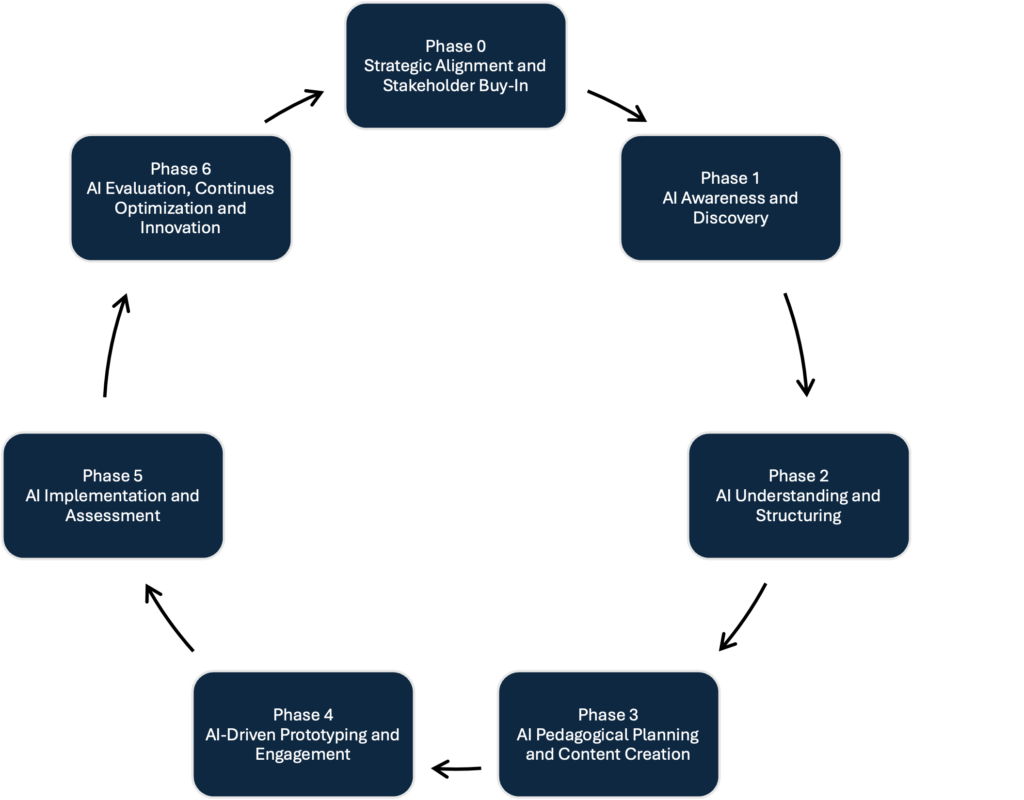Introduction
Without clear strategies, AI integration risks widening existing disparities and undermining academic standards. The AI Course Compass: A Seven-Phase Framework for Ethical, Equitable, and Adaptive Course Design (AI Course Compass Framework) addresses the critical gap of higher education’s AI integration through a structured seven-phase model that balances innovation with systemic ethics. While existing frameworks like OLC’s AI Strategy, ETHICAL Principles, and ARCHED offer valuable high-level guidance, they frequently lack phased roadmaps, course-level specificity, model-agnostic adaptability, and integrated ethics assurance. This framework provides faculty, instructional designers, and other stakeholders with actionable, course-level guidance for integrating AI tools while preserving pedagogical integrity, equity, and human oversight.
Framework Overview
Phase 0: Strategic Alignment and Stakeholder Buy-in
Core Focus: Align institutional l vision, secure leadership support, map resources
A successful AI integration strategy begins with a shared vision and ethical foundation. Leadership, instructional designers, and faculty collaborate to define institutional goals for AI use, align resources, and establish accountability structures.
Phase 1: AI Awareness and Discovery
Core Focus: Build foundational AI literacy and explore course-specific opportunities.
This phase focuses on cultivating baseline AI literacy relevant to course and discipline needs. Faculty and instructional designers explore AI capabilities, identify ethical considerations, and map initial opportunities for meaningful integration.
Phase 2: AI Understanding and Structuring
Core Focus: Map curriculum structures, define AI-supported elements, assess ethics and accessibility.
Participants structure how AI will support specific curriculum components. Ethical alignment, accessibility checks, and clarity of learning outcomes guide this mapping, ensuring AI adoption strengthens equity and student success.
Phase 3: AI Pedagogical Planning and Content Creation
Core Focus: Align AI tool(s) to learning outcomes, generate curate course content ethically.
Faculty and instructional designers align AI tools with pedagogical goals, using AI to support content generation and instructional design. Human oversight ensures all content reflects disciplinary standards, promotes inclusivity, and maintains academic integrity
Phase 4: AI-Driven Prototyping and Engagement
Core Focus: Pilot AI-enhanced modules, gather feedback, and refine engagement strategies.
Early versions of AI-supported learning activities are piloted with students or peer reviewers. Feedback loops enable rapid adjustment of tools and strategies, helping to refine both technological implementation and the quality of learner engagement.
Phase 5: AI Implementation and Assessment
Core Focus: Scale AI-enhanced activities, monitor learning outcomes, and validate tool effectiveness.
Full-scale course implementation proceeds after prototypes are refined. Assessment strategies measure the impact of AI integration of learning objectives, providing critical data to validate effectiveness.
Phase 6: AI Evaluation, Continuous Optimization, and Innovation
Core Focus: Evaluate impact, optimize practices, and foster sustainable innovation.
The final phase emphasizes iterative evaluation and innovation. Stakeholders use data driven insights to optimize practices, address evolving ethical concerns, and support a culture of continuous improvement.

Key Strategic Advantages:
- Ethical Foundations: Strategic alignments and systemic ethics check at every phase.
- Faculty Empowerment: Faculty lead AI integration with clear responsibilities
- Concrete Deliverables: Each phase produces actionable outputs (e.g., curriculum maps, engagement dashboards).
- Continuous Innovations: Built-in feedback and optimization loops
- Model-Agnostic Flexibility: Designed to integrate with any AI platform or toolset, ensuring sustainability and adaptability as technologies evolve.
Balancing AI and Human Expertise
AI offers powerful capabilities for content creation, assessment, and engagement. However, it cannot replace human judgment, creativity, or authentic relationships. Effective course design and development incorporates contextual information, critical thinking growth, and building real learner connections.
Role-Based Collaboration Model
Instructional Designers
Phases Involved: 0 – 4
Contribution: Lead strategic planning, course mapping, prompt engineering, prototyping.
Faculty
Phases Involved: 1 – 5
Contribution: Co-design content, maintain pedagogical integrity, oversee implementation.
Administrators (Leaders)
Phases Involved: 0 – 2
Contribution: Provide leadership, policy guidance, and resource support.
Researchers
Phases Involved: 2, 4 – 6
Contribution: Support assessment design, ethical evaluation, data-driven analysis, and contribute to evidence-based continuous improvement.
Implications and Recommendations
- Institutions: Prioritize Phase 0 to build leadership commitment, allocate resources, and ethical readiness
- Faculty and Instructional Designers: Apply the phased roadmap to guide structured sustainable AI course design and course development.
- Researchers: Evaluate the impact of AI integration and contribute to ongoing ethical inquiry.
Conclusion
The AI Compass Framework provides a practical, ethical, and adaptive roadmap for AI alignment in course design and development. By embedding systemic ethics, role clarity, and iterative innovation, it provides educators tools to navigate course design and development with purpose, confidence, and integrity.
Author’s Note: Portions of the brainstorming, outlining, and idea refinement processes for this white paper were supported by AI-assisted tools. All final content, interpretations, and framework development reflect the author’s original synthesis, judgment, and professional expertise.
Author’s Note: Portions of the brainstorming, outlining, and idea refinement processes for this white paper were supported by AI-assisted tools. All final content, interpretations, and framework development reflect the author’s original synthesis, judgment, and professional expertise.
References
Li, H., Fang, Y., Zhang, S., Lee, S. M., Wang, Y., Trexler, M., & Botelho, A. F. (2025). ARCHED: A Human-Centered Framework for Transparent, Responsible, and Collaborative AI Assisted Instructional Design. arXiv preprint arXiv:2503.08931
Wynants, S., Childers, G., De La Torre Roman, Y., Budar-Turner, D., & Vasquez, P. (2025). ETHICAL Principles AI Framework for Higher Education. California State University, Fullerton. Retrieved April 26, 2025, from https://genai.calstate.edu/communities/faculty/ethical-and-responsible-useai/ethicalprinciples-ai-framework-higher-education
Online Learning Consortium. (2024). Framework for comprehensive design, equitable implementation, and continuous improvement of AI strategy. Online Learning Consortium. Retrieved April 26, 2025, from https://onlinelearningconsortium.org/ai-strategy-framework/
Butler University. (n.d.). Faculty framework for generative AI. Butler University OSice of Educational ESectiveness and Technology. Retrieved April 30, 2025, from https://www.butler.edu/oeet/resources/generative-ai/faculty-framework/
AI Course Compass: A Seven-Phase Framework for Ethical, Equitable, and Adaptive Course Design © 2025 by Marcus Green is licensed under CC BY-NC-ND 4.0
 Marcus Green works as an instructional designer at Kennesaw State University. He have over 20+ years of translating research-based pedagogy and emerging ed-tech into engaging and learner-centered experiences in education.
Marcus Green works as an instructional designer at Kennesaw State University. He have over 20+ years of translating research-based pedagogy and emerging ed-tech into engaging and learner-centered experiences in education.





